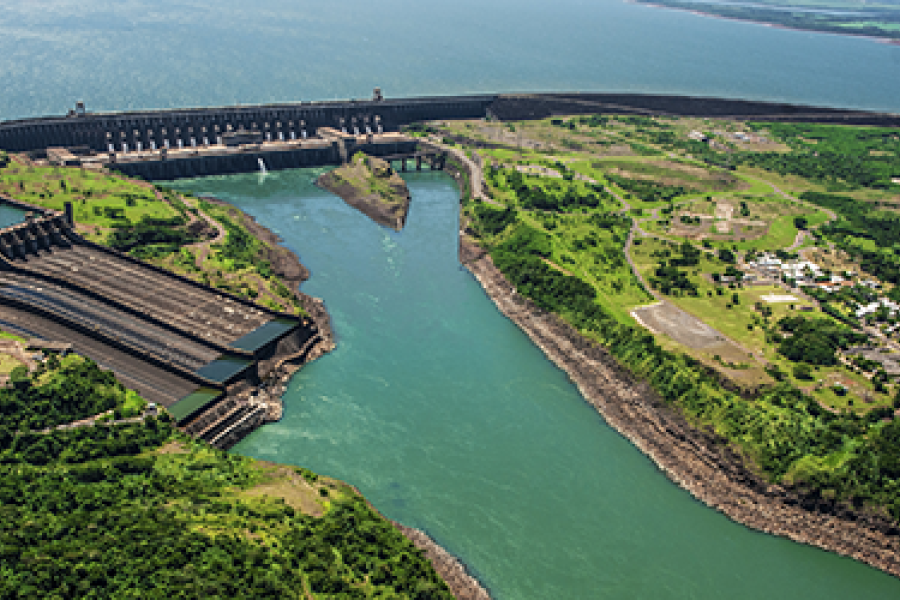Participation of ECLAC in the webinar "Sustainable business models for the financing, operation and maintenance of multipurpose dams" of Itaipu Binacional
Work area(s)
Topic(s)
Teaser
Itaipu Binacional organized a series of webinars “Towards the IX World Water Forum” in preparation for the IX World Water Forum.
Event information

Date
9 Mar 2022 - 09:20Event type
On March 8, 9 and 10, the series of events "Towards the IX World Water Forum" took place, organized by Itaipu Binacional, with the aim to generate inputs for global debates and consensus during the IX World Water Forum as a result of these discussions.
ECLAC participated in the webinar "Sustainable business models for the financing, operation and maintenance of multipurpose dams", whose objective was to share recommendations to maximize the economic benefits of multipurpose dams (generation, navigation and consumption) and present different financing options according to example projects.
Due to the complexity and the various actors involved in a multipurpose dam, there is a need to create sustainable business models for the financing, operation and maintenance of these types of projects that consider economic, social and environmental aspects.
The conference was moderated by Ariel Scheffer, Superintendent of Environmental Management, Itaipu Binacional. Panellists who presented at the webinar were: Rebecca Ellis, Energy Policy Manager of the International Hydroelectric Power Association; Silvia Saravia Matus, Official of the Water and Energy Unit of the Economic Commission for Latin America and the Caribbean; and Alan Vaz Lopes, Auditing Superintendent, National Water Agency of Brazil. The session also considered interaction with the audience through a discussion section, questions and answers.
Silvia Saravia Matus from ECLAC presented the "Analysis and evaluation of multipurpose systems with a focus on the Nexus between water, energy and food". She mentioned how multipurpose dams, by their nature, are systems that require a focus on the Nexus water-energy-food, as well as the active involvement of actors at different levels, mainly those affected by these projects. To do so, she presented the Methodological Guide developed by ECLAC for the adoption of the Nexus approach in the region, which has been used for the evaluation of two case studies, the Misicuni multipurpose dam in Bolivia and the Baba multipurpose dam in Ecuador. Based on these two evaluations, several recommendations could be drawn: for example, financial planning and leadership are essential for the successful execution of these types of projects since, on many occasions, the necessary investment needs for accurate operation could not be foreseen either due to lack of funds or because of uncoordinated planning between the parts of the multipurpose dams, which in turn did not mobilize all the actors involved. The main bottlenecks identified in this analysis were: 1) disproportionateness in funding levels, 2) social resistance to selected components of multipurpose projects, and 3) the lack of planning in the medium and long term.
Therefore, ECLAC recommended 1) strengthening financial planning and leadership, which at a cross-border scale requires more complex coordination and decision-making efforts, as well as political commitment and clear rules between the countries and user sectors involved; 2) promoting dialogue and participation as a basis for the development of inclusive, effective and socially acceptable actions. 3) Strengthen the analysis of the causes generating the problems to achieve comprehensive solutions that are effective and precise, 4) promote instances of coordination and dialogue between public agencies and relevant intersectoral actors at different scales, and 5) dedicate resources to be able to carry out monitoring and follow-up of projects. In addition to these recommendations, the leadership of political representatives is essential when promoting these actions and when finding creative formulas for their financing. For example, suppose there is a vision of the highest financial officials of the countries of the need to promote joint investments as a strategy to achieve the highest social return in the most efficient way possible. In that case, it is feasible to search for formulas that help overcome the financing barriers of investments, operations and maintenance that are economically, socially and environmentally sustainable.
